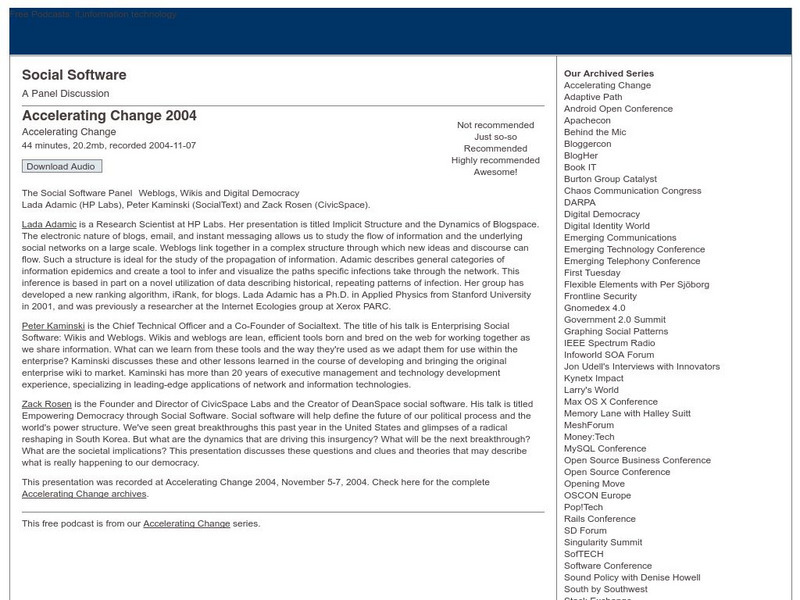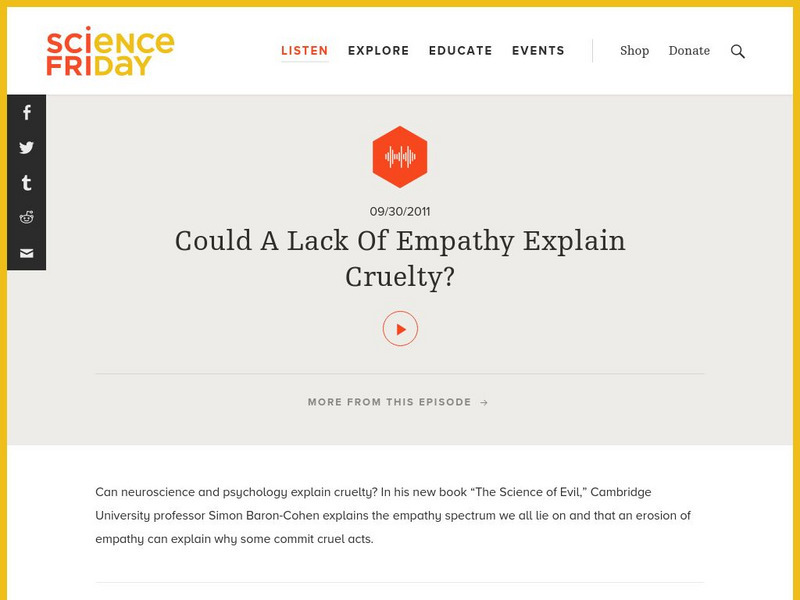National WWII Museum
Franklin Roosevelt's Pearl Harbor Address - December 8, 1941
The audio of President Franklin Roosevelt's speech regarding Pearl Harbor teaches pupils about the attack and its impact on the United States' involvement in World War II.
National WWII Museum
Harry S. Truman's Atomic Bomb Address - August 9, 1945
The United States' decision to implement the atomic bomb in 1945 is still a source of debate today. Learners listen to the audio from President Truman's speech to address the nation to better understand why the United States resorted to...
Other
It Conversations: Social Software
This podcast features a panel discussion from Accelerating Change 2004 on Weblogs, Wikis and Digital Democracy with Lada Adamic (HP Labs), Peter Kaminski (SocialText) and Zack Rosen (CivicSpace).
Other
Committee for Children: The Grow Kinder Podcast
A compilation of episodes from The Grow Kinder Podcast are provided on this site.
Backstory Radio
Back Story Radio: The Departed: Extinction in America
Audio [52:02] from BackStory Radio discussing the rate of plant and animal extinction, what it means for our ecosystem and how Americans grapple with the idea of species loss. The American History Guys ask pertinent questions linking...
PBS
Pbs Learning Media: Rethinking Fast Fashion After Bangladesh
Use an essay to start a discussion about consumerism in America or challenge students to research where their clothing came from, and what living and working conditions are like in that country.
Science Friday Initiative
Science Friday: Microexpressions: More Than Meets the Eye
By studying split-second facial expressions, psychologists hope to uncover hidden emotional cues.
Center For Civic Education
60 Second Civics: Episode 105: The Rennaisance Part 2
On the podcast today, we continue our discussion of the Renaissance. People learned that they did not need to stay within the social class they were born into allowing for opportunities. [1:15]
Center For Civic Education
60 Second Civics: How Congress Functions: Pt. 16: How a Bill Becomes a Law
The lengthy process a bill must go through before it becomes a law is explained.
Center For Civic Education
60 Second Civics: How Congress Functions: Pt. 18: Mark Up Sessions
Mark-up sessions are committee meetings that happen at a later stage in the process a bill goes through before a final vote in the Senate or the House.
Center For Civic Education
60 Second Civics: How Congress Functions: Pt. 19: Conference Committees
A conference committee is comprised of members from both chambers of Congress. It tries to resolve differences between the House and the Senate over the content of a bill. It issues a conference report to both chambers for a vote.
Center For Civic Education
60 Second Civics: How Congress Functions: Pt. 21: Majority Support
At every stage in the process of becoming a law, a bill is scrutinized and must have majority support for it in order to be moved along.
BBC
Bbc Podcasts: Episode 19: Mold Gold Cape 11 Feb 2010
A gold cape made almost 4,000 years ago and discovered in 1833, by a group of workmen looking for stones in a field near the village of Mold in North Wales. This sheet of pure gold, found wrapped around a skeleton, inspires Neil...
Science Friday Initiative
Science Friday: Frans De Waal and 'The Age of Empathy'
Is it human nature to be greedy and selfish? Primatologist Frans de Waal doesn't think so. In his new book "The Age of Empathy: Nature's Lessons For a Kinder Society" de Waal says empathy and solidarity are our primate heritage. De Waal...
Science Friday Initiative
Science Friday: Could a Lack of Empathy Explain Cruelty?
Simon Baron-Cohen explains the consequences of decreased empathy.
Other popular searches
- Social Skills Lesson Plans
- Autism Social Skills
- Personal Space Social Skills
- Social Skills for Teens
- Current Events Social Skills
- Social Skills Adolescents
- Social Skills Lessons
- Social Skills Games
- Team Building Social Skills
- Circle Time Social Skills
- Teaching Social Skills
- Cooperation Social Skills






